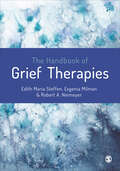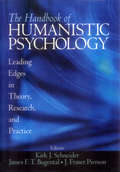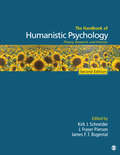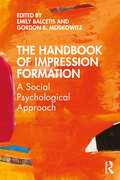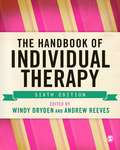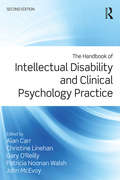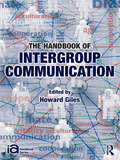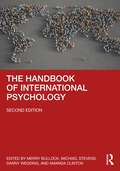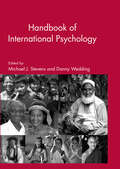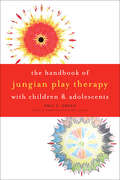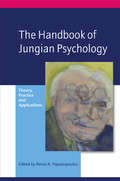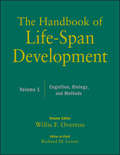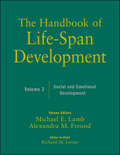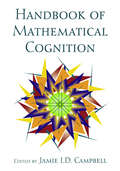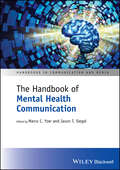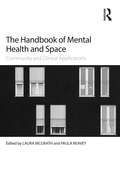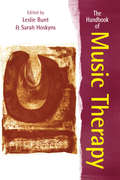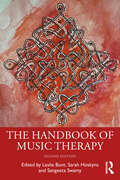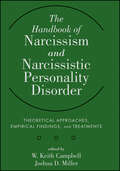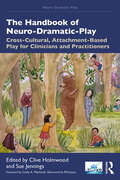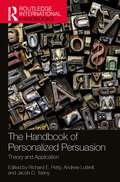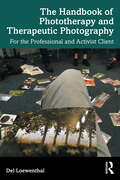- Table View
- List View
The Handbook of Grief Therapies
by Robert A. Neimeyer Edith Maria Steffen Evgenia MilmanA comprehensive and up-to-date handbook that surveys the field of grief therapy. With contributions from leading international scholars and practitioners, it covers: Foundational matters such as clinical presentations in bereavement, the conceptualization of grief therapy and its evidence base; distinctive approaches to grief therapy including existential therapy, art therapy, CBT and narrative, psychodynamic and meaning-based approaches; specific circumstances of death such as violent death and suicide, and particular populations such as bereaved parents and grieving children; professional issues such as training in grief therapy and therapist self-care. The handbook is designed with students and practitioners in mind, with vivid case studies that bring theory and practice to life, key-point summaries at the end of each chapter and recommendations for further reading on each topic.
The Handbook of Grief Therapies
by Robert A. Neimeyer Edith Maria Steffen Evgenia MilmanA comprehensive and up-to-date handbook that surveys the field of grief therapy. With contributions from leading international scholars and practitioners, it covers: Foundational matters such as clinical presentations in bereavement, the conceptualization of grief therapy and its evidence base; distinctive approaches to grief therapy including existential therapy, art therapy, CBT and narrative, psychodynamic and meaning-based approaches; specific circumstances of death such as violent death and suicide, and particular populations such as bereaved parents and grieving children; professional issues such as training in grief therapy and therapist self-care. The handbook is designed with students and practitioners in mind, with vivid case studies that bring theory and practice to life, key-point summaries at the end of each chapter and recommendations for further reading on each topic.
The Handbook of Humanistic Psychology: Leading Edges in Theory, Research, and Practice
by Kirk J. Schneider J. Fraser Pierson Dr James F. BugentalThe Handbook of Humanistic Psychology is a landmark in the resurgent field of humanistic psychology and psychotherapy. Their range of topics is far-reaching--from the historical, theoretical, and methodological, to the spiritual, psychotherapeutic, and multicultural. Students and professionals are looking for the fuller, deeper, and more personal psychological orientation that this Handbook promotes.
The Handbook of Humanistic Psychology: Theory, Research, and Practice
by Kirk J. Schneider J. Fraser Pierson Dr James F. BugentalThe Second Edition of the cutting edge work, The Handbook of Humanistic Psychology, by Kirk J. Schneider, J. Fraser Pierson and James F. T. Bugental, represents the very latest scholarship in the field of humanistic psychology and psychotherapy. Set against trends inclined toward psychological standardization and medicalization, the handbook offers a rich tapestry of reflection by the leading person-centered scholars of our time. Their range in topics is far-reaching—from the historical, theoretical and methodological, to the spiritual, psychotherapeutic and multicultural. The new edition of this widely adopted and highly praised work has been thoroughly updated in accordance with the most current knowledge, and includes thirteen new chapters and sections, as well as contributions from twenty-three additional authors to extend the humanistic legacy to the emerging generation of students, scholars, and practitioners.
The Handbook of Impression Formation: A Social Psychological Approach
by Emily Balcetis Gordon B. MoskowitzPresenting diverse perspectives from eminent scholars and contemporary researchers, The Handbook of Impression Formation contextualizes current and future areas of research in the social psychology of impression formation within a rich historic framework. Affirming that impression formation is at the core of human experience, chapters explore how and why people form snap judgments about others and when those impressions update. They examine the processes through which people infer the reasons for the events they encounter, allowing people to plan for appropriate behavioral responses to social contexts. The research reviewed is informed by the foundational theory of unconscious automatic processes involved in making judgements of other people, pioneered by Professor Jim Uleman who contributes a chapter that suggests important new directions, and concludes the volume by reflecting on the state of the field more broadly. The book explores how certain attributes stimulate categorization, examining current issues around implicit bias, stereotypes, and social media. Chapters cover a range of approaches, featuring personal narratives, presentation of new data and discoveries, comprehensive literature reviews, and contemplations on where the field must go and what questions require focus for progress to be made, calling for even the most advanced scholars to contribute more to the collective investigation of impression formation. This fascinating work provides a solid foundation from which all researchers can build a new and unique program of research, and arms the reader with the intellectual tools they need to chart new theoretical territory and discover aspects of the human experience we have yet to even wonder about. It is essential reading for students and academics in social psychology, and the social sciences more broadly.
The Handbook of Impression Formation: A Social Psychological Approach
by Emily Balcetis Gordon B. MoskowitzPresenting diverse perspectives from eminent scholars and contemporary researchers, The Handbook of Impression Formation contextualizes current and future areas of research in the social psychology of impression formation within a rich historic framework. Affirming that impression formation is at the core of human experience, chapters explore how and why people form snap judgments about others and when those impressions update. They examine the processes through which people infer the reasons for the events they encounter, allowing people to plan for appropriate behavioral responses to social contexts. The research reviewed is informed by the foundational theory of unconscious automatic processes involved in making judgements of other people, pioneered by Professor Jim Uleman who contributes a chapter that suggests important new directions, and concludes the volume by reflecting on the state of the field more broadly. The book explores how certain attributes stimulate categorization, examining current issues around implicit bias, stereotypes, and social media. Chapters cover a range of approaches, featuring personal narratives, presentation of new data and discoveries, comprehensive literature reviews, and contemplations on where the field must go and what questions require focus for progress to be made, calling for even the most advanced scholars to contribute more to the collective investigation of impression formation.This fascinating work provides a solid foundation from which all researchers can build a new and unique program of research, and arms the reader with the intellectual tools they need to chart new theoretical territory and discover aspects of the human experience we have yet to even wonder about. It is essential reading for students and academics in social psychology, and the social sciences more broadly.
The Handbook of Individual Therapy
by Windy Dryden Dr Andrew Reeves'[This] is essential reading for all who aspire to professional practice to ensure that knowledge and skills are up to date in order to best serve their clients.' Professor Sue Wheeler, University of Leicester '[It] continues to be the book that one turns to when looking for a clear introduction to the broad range of therapies that are offered in the UK today.' Dr Nick Midgley, Anna Freud Centre This classic text has helped over 50,000 students wishing to understand the key counselling and psychotherapy approaches. This sixth edition is the most comprehensive update since it was first published in 1984, with 15 newly contributed chapters and 8 updated chapters. Each approach now includes a new Research section summarising the research findings, an in-depth Case Study illustrating how that approach works in practice, and an extended Practice section. Also covered: · historical context and development · main theoretical assumptions · which clients will benefit most · strengths and limitations. New chapters include Compassion-Focussed Therapy, Interpersonal Therapy, Mindfulness in Individual Therapy, Pluralistic Therapy and The Transpersonal in Individual Therapy. This is an ideal one-stop shop for trainees of counselling, psychotherapy, counselling psychology, psychology and other allied professions wanting to learn about the most commonly practised therapies today. Windy Dryden has worked in the fields of counselling and psychotherapy since 1975. He is author/editor of over 200 books. Andrew Reeves is a BACP Senior Accredited Counsellor/Psychotherapist at the Univeristy of Liverpool and a freelance writer, trainer and supervisor. He is former Editor of the Counselling and Psychotherapy Research journal.
The Handbook of Intellectual Disability and Clinical Psychology Practice
by Alan Carr Patricia Noonan Walsh Christine Linehan Gary O'Reilly John McEvoyThe Handbook of Intellectual Disability and Clinical Psychology Practice will equip clinical psychologists in training with the skills necessary to complete a clinical placement in the field of intellectual disability. Building on the success of the previous edition this handbook has been extensively revised. Throughout, the text, references, and website addresses and have been updated to reflect important developments since the publication the first edition. Recent research findings on the epidemiology, aetiology, course, outcome, assessment and treatment of all psychological problems considered in the book have been incorporated into the text. Account has been taken of changes in the diagnosis and classification of intellectual disability and psychological problems reflected in the AAIDD-11 and the DSM-5. New chapters on the assessment of adaptive behaviour and support needs, person-centred active support, and the assessment of dementia in people with intellectual disability have been added. The book is divided into eight sections: Section 1: Covers general conceptual frameworks for practice - diagnosis, classification, epidemiology and lifespan development. Section 2: Focuses on assessment of intelligence, adaptive behaviour, support needs, quality of life, and the processes of interviewing and report writing. Section 3: Covers intervention frameworks, specifically active support, applied behavioural analysis and cognitive behaviour therapy. Section 4: Deals with supporting families of children with intellectual disability, genetic syndromes and autism spectrum disorders. Section 5: Covers issues associated with intellectual disability first evident or prevalent in middle childhood. Section 6: Deals with adolescent concerns including life skills training, relationships and sexuality. Section 7: Focuses on residential, vocational and family-related challenges of adulthood and aging. Section 8: Deals with professional issues and risk assessment. Chapters cover theoretical and empirical issues on the one hand and practice issues on the other. They close with summaries and suggestions for further reading for practitioners and families containing a member with an intellectual disability. Where appropriate, in many chapters, practice exercises to aid skills development have been included. The second edition of the Handbook of Intellectual Disability and Clinical Psychology Practice is one of a set of three volumes which cover the lion’s share of the curriculum for clinical psychologists in training in the UK and Ireland. The other two volumes are the Handbook of Child and Adolescent Clinical Psychology, Third Edition (by Alan Carr) and the Handbook of Adult Clinical Psychology Practice, Second Edition (edited by Alan Carr & Muireann McNulty).
The Handbook of Intergroup Communication (ICA Handbook Series)
by Michael Hogg Howard Giles Miles Hewstone Jake Harwood Cynthia Gallois Scott A. Reid John C. TurnerThe Handbook of Intergroup Communication brings together research, theory and application on traditional as well as innovative intergroup situations, exploring the communication aspect of these groups. The volume is organized into four domains – cross-disciplinary approaches to intergroup study; types/processes of communication between groups; communication between specific group types; and arenas in which intergroup communication takes place. Editor Howard Giles worked with an internationally-based advisory board to develop and review content, and the contributors included here represent those scholars doing innovative and well-regarded work around the globe. The "intergroup" umbrella integrates and transcends many traditional conceptual boundaries in communication (including media, health, intercultural, organizational); hence the Handbook will appeal to scholars and graduate students not only in the core area of intergroup communication itself, but across varying terrains of study in communication and beyond, including intergroup relations and social psychology.
The Handbook of International Psychology
by Danny Wedding Michael Stevens Merry Bullock Amanda ClintonThis second edition of The Handbook of International Psychology chronicles the discipline of psychology as it evolves in different regions, from the perspective of those living and working in the countries they write about.This volume surveys the history, methodology, education, training, and future of psychology in more than 100 countries/territories, organized by region and continent. In this thoroughly updated and expanded edition, chapters highlight the important ways in which psychological knowledge and services are contextualized through culture, history, geography, social, and political forces.This comprehensive handbook is essential for students and teachers of psychology, as well as professionals wanting to develop their understanding of psychology around the world.
The Handbook of International Psychology (Oxford Library Of Psychology Ser.)
by Danny Wedding Michael J. StevensWorld events have raised pressing questions of psychology as it is practiced all over the globe. The Handbook of International Psychology chronicles the discipline of psychology as it evolves in different regions, in the hope of reducing the isolated, parochial, and ethnocentric nature of the American profession. It surveys the history, methodology, education and training, and the future of psychology in nine distinct regions across six continents. They represent long histories in the field, such as the United States and the United Kingdom, emerging practices, such as Uganda, Korea and Spain, the lesser-known philosophies of China and histories marked by massive social change, as in Poland and Iran. The editors have carefully selected contributors, as well as an editorial board created especially for this project. Each chapter follows a uniform outline, unifying the volume as a whole, but allowing for the cultural diversity and status of psychology in each country.
The Handbook of Jungian Play Therapy with Children and Adolescents
by Eric J. GreenDemystifying Jungian play therapy for non-Jungian therapists interested in enhancing their clinical repertoire.Child and family psychotherapist Eric J. Green draws on years of clinical experience to explain his original model of Jungian play therapy. The empathic techniques he illuminates in The Handbook of Jungian Play Therapy with Children and Adolescents can effectively treat children who are traumatized by abuse, natural disasters, and other losses, as well as children who have attention deficit and autism spectrum disorders. The overarching goal of Green’s Jungian play therapy model is to help children and adolescents become psychologically whole individuals. Toward that end, therapists encourage children to engage in sandplay, spontaneous drawing, and other expressive arts. Green demonstrates how therapists can create an atmosphere of warmth and psychological safety by observing the child’s play without judgment and, through the therapeutic relationship, help children learn to regulate their impulses and regain emotional equilibrium.Designed for master’s level and doctoral students, as well as school counselors, play therapists, and private practitioners, the book covers the theoretical underpinnings of "depth psychology" while highlighting easy-to-understand case studies from Green’s own practice to illustrate Jungian play therapy applications at work.
The Handbook of Jungian Psychology: Theory, Practice and Applications
by Renos K. PapadopoulosThe field of Jungian psychology has been growing steadily over the last twenty years and awareness is increasing of its relevance to the predicaments of modern life. Jung appeals not only to professionals who are looking for a more humane and creative way of working with their clients, but also to academics in an increasingly wide range of disciplines. This Handbook is unique in presenting a clear, comprehensive and systematic exposition of the central tenets of Jung’s work which has something to offer to both specialists and those seeking an introduction to the subject. Internationally recognised experts in Jungian Psychology cover the central themes in three sections: Theory, Psychotherapy & Applications. Each chapter begins with an introduction locating the topic in the context of Jung’s work as a whole, before moving on to an investigation of contemporary developments and concluding by demonstrating how Jung’s theories continue to evolve and develop through their practical therapeutic applications. The Handbook of Jungian Psychology is the definitive source of authoritative information on Jungian psychology for Jungian analysts, psychotherapists, counsellors and related professionals. It will be an invaluable aid to those involved in Jungian academic studies and related disciplines.
The Handbook of Life-Span Development, Cognition, Biology, and Methods
by Richard M. Lerner Willis F. OvertonIn the past fifty years, scholars of human development have been moving from studying change in humans within sharply defined periods, to seeing many more of these phenomenon as more profitably studied over time and in relation to other processes. The Handbook of Life-Span Development, Volume 1: Cognition, Biology, and Methods presents the study of human development conducted by the best scholars in the 21st century. Social workers, counselors and public health workers will receive coverage of of the biological and cognitive aspects of human change across the lifespan.
The Handbook of Life-Span Development, Social and Emotional Development
by Richard M. Lerner Michael E. Lamb Alexandra M. FreundIn the past fifty years, scholars of human development have been moving from studying change in humans within sharply defined periods, to seeing many more of these phenomenon as more profitably studied over time and in relation to other processes. The Handbook of Life-Span Development, Volume 2: Social and Emotional Development presents the study of human development conducted by the best scholars in the 21st century. Social workers, counselors and public health workers will receive coverage of the social and emotional aspects of human change across the lifespan.
The Handbook of Mathematical Cognition
by Jamie I.D. CampbellHow does the brain represent number and make mathematical calculations? What underlies the development of numerical and mathematical abilities? What factors affect the learning of numerical concepts and skills? What are the biological bases of number knowledge? Do humans and other animals share similar numerical representations and processes? What underlies numerical and mathematical disabilities and disorders, and what is the prognosis for rehabilitation? These questions are the domain of mathematical cognition, the field of research concerned with the cognitive and neurological processes that underlie numerical and mathematical abilities. The Handbook of Mathematical Cognition is a collection of 27 essays by leading researchers that provides a comprehensive review of this important research field.
The Handbook of Mental Health Communication
by Jason T. Siegel Marco C. YzerThe first book of its kind to offer a transdisciplinary exploration of mass communication approaches to mental health In the Handbook of Mental Health Communication, a panel of leading scholars from multiple disciplines presents a comprehensive overview of theory and research at the intersection of mass communication and mental health. With timely and authoritative coverage of the impact of message-based mental health promotion, this unique volume places mental health communication in the context of socio-cultural causes of mental illness — synthesizing public health, psychopathology, and mass communication scholarship into a single volume. Throughout the Handbook, nearly one hundred contributing authors emphasize that understanding communication effects on mental health outcomes begins with recognizing how people across the spectrum of mental illness process relevant information about their own mental health. Fully integrated chapters collectively translate biased information attention, interpretation, and memory in mental health illness to real-world implications of mental illness symptomatology and across the spectrum of mental health issues and disorders. Providing a clear, evidence-based picture of what mental health promotion should look like, The Handbook of Mental Health Communication is an invaluable resource for advanced undergraduate and graduate students, scholars, researchers, lecturers, and all health communication practitioners.
The Handbook of Mental Health and Space: Community and Clinical Applications
by Paula Reavey Laura McGrathThe Handbook of Mental Health and Space brings together the psychosocial work on experiences of space and mental distress, making explicit the links between theoretical work and clinical and community practice. The change from an institutional to community care model of mental health services can be seen as a fundamental spatial change in the lives of service users, and the book aims to to stimulate discussion about mental healthcare spaces and their design.With contributions from those involved in theorizing space, those drawing on their own experiences of distress and space, as well as practitioners working on the ground,the book will be of interest to mental health practitioners and academics.
The Handbook of Music Therapy
by Leslie Bunt Sarah HoskynsMusic therapists work with children and adults of all ages with wide-ranging health-care needs. This handbook traces the history of recent developments in music therapy and the range of current applications and outlines practical requirements for the work and some basic prerequisites for and philosophies of training.The Handbook of Music Therapy covers material encompassing clinical, practical and theoretical perspectives, and is divided into four main sections, including:* the recent evolution of music therapy as a paramedical discipline complementing the more traditional areas of child and adult health care* a clinical section including contributions from music therapy specialists in the fields of autism, adult learning disability, forensic psychiatry, neurology and dementia* a section on resources necessary to practise as a music therapist including musical illustrations and practical examples* a focus on issues pertinent to the life of the professional music therapist including job creation, supervision, further training and research. The Handbook of Music Therapy is illustrated with many case studies and clinical examples throughout, placed within a variety of different theoretical and philosophical perspectives. It will be invaluable to music therapists, other arts therapists and to clinicians such as speech and language therapists, psychotherapists, psychiatrists and social workers.
The Handbook of Music Therapy
by Leslie Bunt Sarah Hoskyns Sangeeta SwamyThe Handbook of Music Therapy takes the reader on a journey through the historical and contemporary landscape of the field of music therapy, updated with the latest practical, sociocultural and theoretical perspectives and developments in music therapy.The second edition is divided into four parts: foundation and context; music therapy practice; learning and teaching; and professional life. This includes the trajectory of music therapy as a health, social and community-based discipline in the 21st century with an evolving evidence base that also acknowledges the growing edges in the field, such as perspectives around equity, inclusion and diversity. The editors have included practice-based chapters including contributions from music therapy specialists in the fields of autism, adult learning disability, forensic psychiatry, neurology, immigration and dementia. The second edition is thoroughly updated to showcase a series of new interviews with Elders in the music therapy field, a thoroughly revised first section of the book with new materials on values and principles, updated chapters on music therapy practice, online and print resources supporting music therapy practice including musical illustrations with new and revised examples, and an extensively revised final section with new chapters on professional life and research.Illustrated with rich case studies and practical examples throughout, The Handbook of Music Therapy covers a variety of different theoretical and philosophical perspectives. It will be invaluable to music therapists (novices, students, professionals), other arts therapists and practitioners such as speech and language therapists, psychotherapists, teachers, community musicians, psychiatrists and social workers.
The Handbook of Narcissism and Narcissistic Personality Disorder: Theoretical Approaches, Empirical Findings, and Treatments
by W. Keith Campbell Joshua D. MillerThe Handbook of Narcissism and Narcissistic Personality Disorder is the definitive resource for empirically sound information on narcissism for researchers, students, and clinicians at a time when this personality disorder has become a particularly relevant area of interest. This unique work deepens understanding of how narcissistic behavior influences behavior and impedes progress in the worlds of work, relationships, and politics.
The Handbook of Neuro-Dramatic-Play: Cross-Cultural, Attachment-Based Play for Clinicians and Practitioners (Neuro-Dramatic-Play)
by Sue Jennings Clive HolmwoodAn innovative contribution to our understanding of research and practice behind Neuro-Dramatic-Play (NDP), this book demonstrates how readers may apply this attachment and play-based approach to teaching, parenting, and therapy. This essential book will provide guidance on new techniques and methods, enhancing their practice and providing potential solutions to problems they may be encountering in their work with clients.Filled with diverse contributions from a team of multi-cultural authors, this book is divided into five distinct parts: Section 1 begins by considering the roots and development of NDP, including the science and evidence supporting it as a practice. Section 2 covers applying NDP to work with children and young people, including neurodivergent children and those who have experienced trauma. Section 3 explores how readers can integrate NDP practices into art, drama ,and play therapy. Section 4 moves on to discuss international perspectives on NDP, including NDP practice within a range of different geographical and cultural contexts. Section 5 concludes the book by examining case studies of work with diverse populations, including pregnant women, forensic settings, and people with young on-set dementia. Written for clinicians and therapists of all specialisms, this is a compelling read for any mental health practitioner seeking a practical approach to develop (or re-develop) attachment experiences for individuals who have experienced loss, neglect, rejection, or abuse.
The Handbook of Personalized Persuasion: Theory and Application (Routledge International Handbooks)
by Richard E. Petty Andrew Luttrell Jacob D. TeenyThe Handbook of Personalized Persuasion provides the most comprehensive and state-of-the-art review of the expansive literature on personalized messaging in persuasion.The book describes what features of people, messages, and contexts are most effective for personally tailored communication, and how this knowledge can be leveraged to improve the influence of messaging in any domain. It also addresses when such personalization can be counterproductive or backfire. Bringing together some of the foremost experts in the area, the book consists of a diverse, global, and interdisciplinary set of scholars who tackle the theory and application of personalized persuasion. Organized into two sections, the first part of this book addresses the many aspects of people to which messages can be targeted, such as the basis of a person’s attitude or the person’s goals or identity. The second part of this book tackles the many important areas of application in which personalized messaging has been examined, such as political and health messaging, consumer advertising, and even online misinformation.This handbook is essential reading for researchers and students in social psychology and across the behavioral and social sciences, while also offering practitioners in marketing, government, and beyond the most cutting-edge insights into how to maximize the influence of personalized persuasion.
The Handbook of Phototherapy and Therapeutic Photography: For the Professional and Activist Client
by Del LoewenthalThis text introduces the concepts, essential tenets and basic techniques of Phototherapy and Therapeutic Photography. Through the use of case studies and the author’s own professional experience, this book covers the practices, together with their theories and research behind phototherapy and therapeutic photography providing a comprehensive range of major approaches. Examples include Talking Pictures Therapy, Reenactment Phototherapy, the creation of therapeutic photo-books, stories, and diaries, and the therapeutic use of portraiture. Chapters also explain how we can effectively use these techniques in a variety of contexts including private practice, voluntary organisations, schools, prisons and management consultancy, as useful adjuncts to primary practices as well as for self-help. This handbook is for therapists, photographers, other professionals, clients and activist clients.
The Handbook of Play Therapy and Therapeutic Play
by Linnet McMahonThis completely revised and updated second edition provides a comprehensive introduction to using play to communicate with troubled or traumatized children and their families, and to heal emotional damage. The book gives examples of good practice in different settings and situations. Drawing on psychodynamic, systemic and attachment theory, the book provides an integrated theory base for using play in therapeutic work with children. It emphasizes non-directive approaches to therapeutic play and play therapy, based on supporting the child’s developing self within the safe boundaries provided by the setting and the worker’s emotional holding and containment. Areas explored include: children with disabilities and illnesses daily living with abused and traumatized children helping troubled families difficulties in early years children experiencing separation, loss and bereavement children moving to new families. The Handbook of Play Therapy and Therapeutic Play is an invaluable resource for all of those using play therapy with children and will appeal not only to play therapists but also to professionals working in the broader field of therapeutic play. It will be useful whether the readers are at the beginning of their training or are well-established and experienced practitioners and managers.
